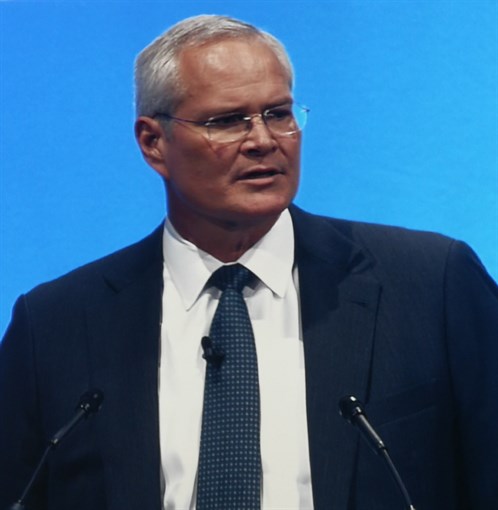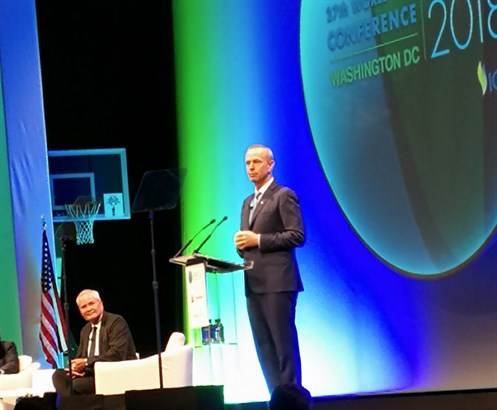WGC '18: ExxonMobil, Chevron CEOs discuss environment, end to "energy poverty"
By Adrienne Blume, Editor
WASHINGTON DC—Daniel Yergin, Vice Chairman of IHS Markit, opened the plenary session of the 2018 World Gas Conference (WGC) on Tuesday, alongside ExxonMobil Chairman and CEO Darren Woods and Chevron Chairman and CEO Michael Wirth.
 |
| ExxonMobil Chairman and CEO Darren Woods |
Mr. Yergin noted that a number of pressing questions characterize this year's WGC, including the future of competition among natural gas, coal and renewables in the electricity sector and the role of gas in the energy transition.
Building infrastructure to support the development of new markets and LNG are key to investment and planning, Mr. Yergin said. "A question in everyone's mind is: What is this turbulence in the back of the trading system, and how will it affect the industry?" the Vice Chairman said. "The LNG industry has actually depoliticized the European gas market, although you wouldn't really know that from a lot of the rhetoric that's out there."
IHS Markit sees gas demand growing by 1.8% per year through 2035. LNG demand is anticipated to double over the same period. Mr. Yergin also noted that 15 to 20 new LNG importers will be added between 2018 and 2035. "It's much more of a global industry; it's very interconnected," Mr. Yergin said.
ExxonMobil chief touts environmental achievements. Mr. Woods spoke next about how shale gas has boosted the US economy, transformed markets around the world, and had a profound impact on mitigating climate change. The gas revolution is "…improving living standards, lifting people out of poverty, improving the economy, and creating living, vibrant communities," the ExxonMobil chief said.
At the same time, companies must address climate change. "This is the industry's dual challenge," Mr. Woods remarked. To this end, ExxonMobil R&D is focusing on solutions to provide energy and cut emissions. In power generation, carbon capture and storage is one of the company's major focuses. The company has reduced emissions in its chemical business by 7% since 2013. It also has a target of reducing methane emissions in its unconventional production operations by 15% by 2020.
"This is all part of our ongoing drive to reduce emissions in energy solutions," Mr. Woods said.
Chevron CEO emphasizes "reliable, affordable" power. Following Mr. Woods, Mr. Wirth noted that the conversation on the energy transition often contains many questions about a clean energy future.
 |
| Chevron Chairman and CEO Michael Wirth |
"In reality, we are always in an energy transition," the Chevron chief said. "Today's energy reality is more dynamic and more complex than at any time in the past. One dominant energy source will not simply replace another; different energy sources will be needed in different parts of the world."
Reliable, affordable power is the key to job creation, Mr. Wirth said. He gave the example of Bangladesh, where a population that is half the size of the US population lives in an area the size of the state of Wisconsin. Less than 8% of Bangladesh's population has access to reliable electricity.
"We must eliminate energy poverty," Mr. Wirth asserted. By 2040, the world population will increase to more than 9 billion people, and energy production will need to increase by 30% over that time to meet demand.
To end energy poverty, a portfolio of complementary energy sources is needed, along with a partnership of countries and producing organizations to provide this portfolio, said the CEO. To achieve this, free markets—both domestic and international—are essential to balance energy security, economic growth and environmental protection.
The World Gas Conference is taking place June 26–29 in Washington DC.

- RWE strengthens partnerships with ADNOC and Masdar to enhance energy security in Germany and Europe
- TotalEnergies and Mozambique announce the full restart of the $20-B Mozambique LNG project
- Venture Global wins LNG arbitration case brought by Spain's Repsol
- KBR awarded FEED for Coastal Bend LNG project
- Norway pipeline gas export down 2.3% in 2025, seen steady this year



Comments